Filter by
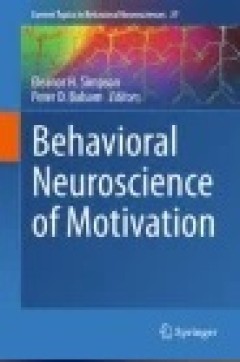
Behavioral Neuroscience of Motivation
This volume covers the current status of research in the neurobiology of motivated behaviors in humans and other animals in healthy condition. This includes consideration of the psychological processes that drive motivated behavior and the anatomical, electrophysiological and neurochemical mechanisms which drive these processes and regulate behavioural output. The volume also includes chapters …
- Edition
- -
- ISBN/ISSN
- 978-3-319-26935-1
- Collation
- XIV, 587
- Series Title
- -
- Call Number
- 616.8
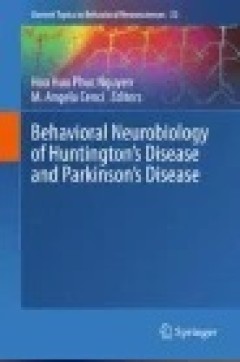
Behavioral Neurobiology of Huntington's Disease and Parkinson's Disease
Motor dysfunction and cognitive impairment are major symptoms in both Huntington’s Disease (HD) and Parkinson’s Disease (PD). A breakthrough in HD research was the identification of the gene that causes this devastating monogenetic illness. Similarly, several genes were found to cause familial forms of PD. With their identification, a plethora of genetic animal models has been generated and…
- Edition
- -
- ISBN/ISSN
- 978-3-662-46344-4
- Collation
- XIII, 397
- Series Title
- -
- Call Number
- 616.8
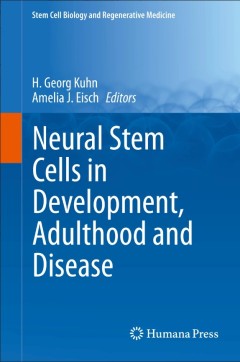
Neural Stem Cells in Development, Adulthood and Disease
This comprehensive volume is the first to specifically target developing, adult and diseased neural stem cells. It explores recent advances in the understanding of neural stem cell biology along with strategies that use these cells to tackle neurological diseases and brain aging. Ten inclusive chapters discuss a wide range of topics including neurogenesis, neurodegeneration, demyelinating disea…
- Edition
- 1
- ISBN/ISSN
- 978-1-4939-1907-9
- Collation
- XXI, 202
- Series Title
- Stem Cell Biology and Regenerative Medicine
- Call Number
- -
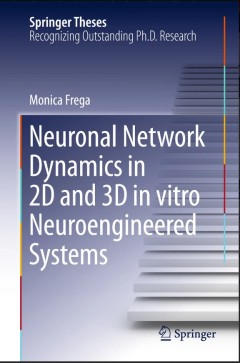
Neuronal Network Dynamics in 2D and 3D in vitro Neuroengineered Systems
The book presents a new, powerful model of neuronal networks, consisting of a three-dimensional neuronal culture in which 3D neuronal networks are coupled to micro-electrode-arrays (MEAs). It discusses the main advantages of the three-dimensional system compared to its two-dimensional counterpart, and shows that the network dynamics, recorded during both spontaneous and stimulated activity, dif…
- Edition
- 1
- ISBN/ISSN
- 978-3-319-80758-4
- Collation
- XIII
- Series Title
- Springer Theses
- Call Number
- -
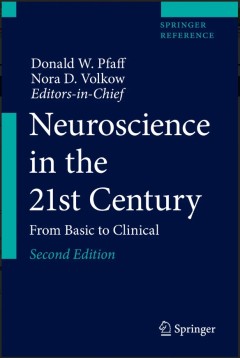
Neuroscience in the 21st Century: From Basic to Clinical
Edited and authored by a wealth of international experts in neuroscience and related disciplines, this key new resource aims to offer medical students and graduate researchers around the world a comprehensive introduction and overview of modern neuroscience. Neuroscience research is certain to prove a vital element in combating mental illness in its various incarnations, a strategic battlegr…
- Edition
- 2
- ISBN/ISSN
- -
- Collation
- LV
- Series Title
- -
- Call Number
- -
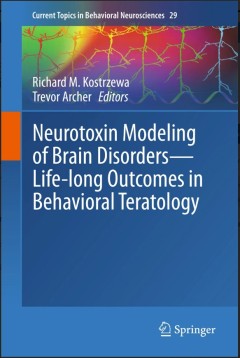
Neurotoxin Modeling of Brain Disorders — Life-long Outcomes in Behavioral T…
This book is authored by leading experts who made major discoveries in neuroteratology research focused on modeling human neural developmental disorders. Individual chapters address ADHD (attention-deficit hyperactivity disorder), Lesch-Nyhan disease, psychoses and schizophrenia, autism, and models of Parkinson’s Disease and tardive dyskinesia. The effects of perinatal stress and agonist insu…
- Edition
- 1
- ISBN/ISSN
- 978-3-319-81683-8
- Collation
- VIII
- Series Title
- Current Topics in Behavioral Neurosciences
- Call Number
- -
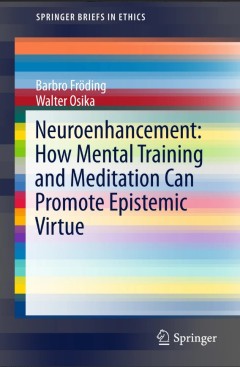
Neuroenhancement: how mental training and meditation can promote epistemic vi…
This book explores how one can bring about changes in the brain through meditation, both through attention-focus training and through compassion training. Recent findings in the natural sciences have confirmed that it is possible for humans to achieve these structural and functional changes through various life-style practices. It is argued that meditation enables us to influence some aspects o…
- Edition
- 1
- ISBN/ISSN
- 978-3-319-23516-5
- Collation
- XI, 110
- Series Title
- SpringerBriefs in Ethics
- Call Number
- -
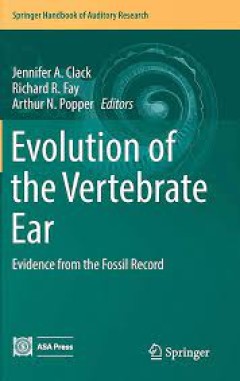
Evolution of the Vertebrate Ear Evidence from the Fossil Record
The evolution of vertebrate hearing is of considerable interest in the hearing community. However, there has never been a volume that has focused on the paleontological evidence for the evolution of hearing and the ear, especially from the perspective of some of the leading paleontologists and evolutionary biologists in the world. Thus, this volume is totally unique, and takes a perspective t…
- Edition
- -
- ISBN/ISSN
- 978-3-319-46661-3
- Collation
- 64 b/w illustrations, 52 illustrations in colour
- Series Title
- -
- Call Number
- -
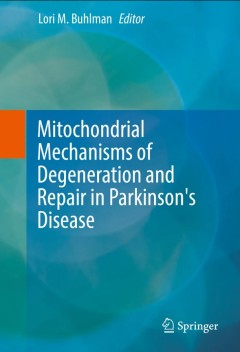
Mitochondrial Mechanisms of Degeneration and Repair in Parkinson's Disease
- Edition
- 1
- ISBN/ISSN
- 978-3-319-42137-7
- Collation
- XII, 275
- Series Title
- -
- Call Number
- -
- Edition
- 1
- ISBN/ISSN
- 978-3-319-42137-7
- Collation
- XII, 275
- Series Title
- -
- Call Number
- -

Evolution of Gibbons and Siamang Phylogeny, Morphology, and Cognition
This volume provides insight into gibbon diet and community ecology, the mating system and reproduction, and conservation biology, all topics which represent areas of substantial progress in understanding socio-ecological flexibility and conservation needs of the hylobatid family. This work analyzes hylobatid evolution by synthesizing recent and ongoing studies of molecular phylogeny, morpholog…
- Edition
- -
- ISBN/ISSN
- 978-1-4939-5614-2
- Collation
- 42 b/w illustrations, 18 illustrations in colour
- Series Title
- -
- Call Number
- -
 Computer Science, Information & General Works
Computer Science, Information & General Works  Philosophy & Psychology
Philosophy & Psychology  Religion
Religion  Social Sciences
Social Sciences  Language
Language  Pure Science
Pure Science  Applied Sciences
Applied Sciences  Art & Recreation
Art & Recreation  Literature
Literature  History & Geography
History & Geography